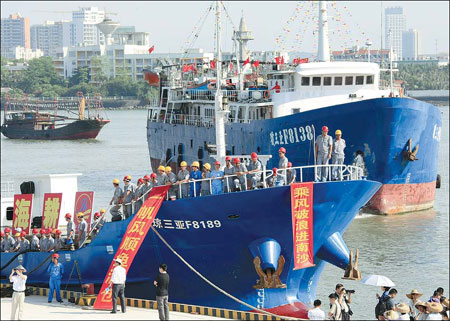IN BRIEF (Page 2)
Updated: 2013-05-10 08:48
(China Daily)
|
|||||||||||
|
A fishing fleet prepares to set sail for Nansha Islands from Danzhou, Hainan province. The operation will last about 40 days. Huang Yiming / China Daily |
Fisheries
Fleet sets sail for Nansha Islands
A fleet including 30 fishing vessels -each weighing more than 100 metric tons - set sail from Hainan province for the Nansha Islands in the South China Sea on May 6.
The 40-day operation is the second of its kind organized by local fishery associations after Sansha city was established in June last year.
Li Nianyou, deputy director of the Hainan provincial department of ocean and fisheries, said the department would make every effort to guarantee the fleet's safety.
After leaving from Danzhou in Hainan, the fleet will arrive at the first fishing ground after four days' sailing, according to the department, which did not disclose details of the locations.
Trade
New markets buy big at fair
Buyers from emerging markets are stepping forward to pick up the slack as orders from developed nations slow.
At the just-ended Canton Fair, a biannual event seen as a barometer of China's foreign trade, orders from BRICS members India, Brazil, Russia and South Africa increased 5.2 percent year-on-year, while those from Middle Eastern countries rose 3.8 percent.
Officially called the China Import and Export Fair, the Canton Fair concluded on May 5 in Guangzhou. It attracted 202,000 overseas merchants, up 7 percent from the autumn session.
Transactions reached $35.54 billion (27.11 billion euros), up 8.8 percent from the last session, but still down 1.4 percent from the spring session last year, organizers said on May 5.
Transactions were down 4.9 percent with Europe, 0.5 percent with the United States and 12.6 percent with Japan year-on-year, as the number of visitors from these areas decreased.
Manufacturing
Down industry hit by bird flu
Down production has declined sharply in China as a consequence of the H7N9 bird flu outbreak, and the cost of down products is likely to soar in winter.
According to the Jiangsu Entry-Exit Inspection and Quarantine Bureau, the province's down-product exports have dropped significantly since last month.
In Jiangsu and Zhejiang provinces, where most Chinese down products are made, about two-thirds of the businesses that work with down have stopped using it. The culling of poultry and closure of poultry markets to halt the spread of the virus have made down hard to come by.
Even if the bird flu can be brought under control this month, it is certain that the output of down will drop by at least one-third this year, said Zhou Jingjie, an engineer at the bureau's down testing laboratory. And the soaring price of down is another problem businesses face.
At the just-concluded Canton Fair, the price of down was 50 to 100 percent higher than last year.
Tourism
Visa policy to attract tourists
Shanghai is trying to consolidate its status as a global hot spot by allowing visitors arriving by passenger liners to spend three days in the city without a visa.
Pending approval from the central government, the city plans to extend the visa-free policy at its two airports to the cruise terminals, and set up duty-free stores and tax-refund outlets there, the Shanghai Municipal Tourism Administration said on May 7. The policy will hopefully be in place within the year, the administration said.
Since Jan 1, air travelers from 45 countries, including the United States, France, Japan and Australia, have been permitted a 72-hour visa-free stay inside the administrative area of Shanghai, a move that has boosted tourism and consumption.
Tourists holding third-country visas and plane tickets are allowed to apply for visa-free transit at the city's Hongqiao and Pudong airports. Before this, Shanghai had been carrying out a program for years to allow visitors arriving from 32 countries by air a 48-hour visa-free stay.
Auto
Austerity drive hurts big wheels
The government's clampdown on official waste and extravagance has put the brakes on China's luxury vehicle market in the first quarter of the year.
Sales growth for the luxury vehicle sector, dominated by German brands Audi, BMW and Mercedes-Benz, slowed to 4 percent, far below the 13 percent annual growth in the passenger car market, according to the China Association of Automobile Manufacturers.
China's luxury vehicle sector had raced ahead at an average annual growth of 36 percent in the past 10 years, according to a report by consulting firm McKinsey & Co.
Analysts attributed the decline to new guidelines to improve officials' working style, and strict policies to curb the use of public funds.
China Daily - Xinhua
(China Daily 05/10/2013 page2)
Today's Top News
List of approved GM food clarified
ID checks for express deliveries in Guangdong
Govt to expand elderly care
University asks freshmen to sign suicide disclaimer
Tibet gears up for new climbing season
Media asked to promote Sino-Indian ties
Shots fired at Washington Navy Yard
Minimum growth rate set at 7%
Hot Topics
Lunar probe , China growth forecasts, Emission rules get tougher, China seen through 'colored lens', International board,
Editor's Picks

|

|

|

|

|

|






